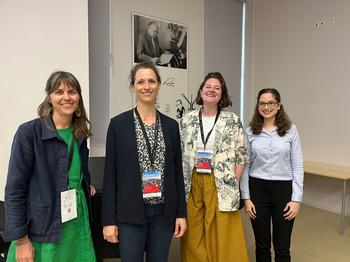Report on Panel and Paper presentations by members of the “Social Worlds: China’s Cities as Spaces of Worldmaking” team at the 25th Biennial Conference of the European Association for Chinese Studies (EACS)
Panel “Reinventing the Chinese Countryside: Smart-Farming, Livestreaming and Landscape Preservation”. From left to right: Florence Graezer Bideau, Lena Kaufmann, Antonie Angerer, Fabienne Wallenwein.
25th Biennial Conference of the European Association for Chinese Studies (EACS), Tallinn, 27-30 August 2024
News vom 27.09.2024
Members of the “Social Worlds: China’s Cities as places of worldmaking” team participated at the 25th Biennial Conference of the European Association for Chinese Studies (EACS) by presenting papers and participating in panel discussions.
Antonie Angerer was invited to present her joined research with Prof. Dr. Elena Meyer-Clement on the “Platformization of Politics” as part of the panel “Reinventing the Chinese Countryside: Smart-Farming, Livestreaming and Landscape Preservation” organized by Dr. Lena Kaufmann and Dr. Fabienne Wallenwein. The panel was completed by Dr. Florence Graezer Bideau as the fourth presenter and Prof. Dr. Ling Minhua as the discussant of the entire panel. The interdisciplinary panel integrated textual-sinological, qualitative-ethnographic, and image-based analysis, that explored the multifaceted aspects of ‘rural revitalisation’. The panel started with Antonie Angerer’s presentation on Rural Guardians (xiangcun shouhuren, 乡村守护人), a program on the short-video platform Douyin, which is part of the larger ‘Bytedance rural plan’ started by the Bytedance charity foundation in 2021. The qualitative content analysis could show how commercial platform and government actors work hand in hand in steering rural video production and dissemination towards both commercially and politically exploitable representations of the countryside. The way digital technology has entered rural developmental politics was complemented by Lena Kaufmann’s presentation on the digitalization of agriculture, for example through the usage of drones. This first presentation into a long-term research project demonstrated how the introduction of new technologies impact social structures in the countryside. The presentations by Wallenwein and Graezer Bideau showed how heritage politics and landscape conservation are used to develop rural regions in China economically through tourism and local products. Both presentations were able to contextualize the Rural Revitalization campaign in a history of rural development initiatives over the last decades.
------
In addition, three individual papers were presented by members of the social worlds project:
On the first day of the conference, Ryanne Flock presented her research on Chinese housing statistics and social change. She analyzed and compared census data from 2000, 2010, and 2020, while focusing on statistics on living space, multigenerational dwelling arrangements and technological equipment that accompanies the transformation of dwelling practices. Rather than understanding housing data as a mere fact, she instead examines the main changes reflected within the data and data categories and takes “old neighbourhoods” as an example of ideal typical dwelling experience to question the social meaning of the statistical development.
---
Moreover, team members Ryanne Flock and Michael Malzer both presented individual papers in the session “Anthropology and Sociology 10”, chaired by Dr. Lena Kaufmann, which was held on the final day of the conference.
Ryanne Flock presented her article “Creating the spectacular city in everyday life: A governance analysis of urban public space in China” (published in Urban Studies November 2023) where she argues that efforts of spectacularizing the Chinese city expand to everyday public space. Taking Guangzhou as a case study, she elaborates on the local government’s ideals, strategies and patterns of controlling public space which culminate into zones and periods of increased control.
---
Michael Malzer presented one part of his ongoing dissertation project on urbanization and social change in the Northwestern Chinese city of Yinchuan, titled: “‘English Corners’ in Yinchuan – Islands of Meaning-Making and Social Worlds In and Beyond Everyday Life.” English Corners in the Chinese context can be defined as semi-regular, semi-regulated and semi-public formats of social interaction in the English language, often held in cafés or similar establishments. Based on data obtained in six months of ethnographic fieldwork, he showed how strategies of individual self-improvement and aspirations to connect to a modern and globalized sphere can form a social world which provides a source of group identity, an escape from everyday pressure and a limited public sphere where societal questions can be discussed.

